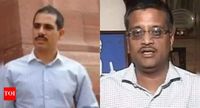Senior IAS officer Ashok Khemka, known for his integrity and his tumultuous career marked by an astonishing 57 transfers, is retiring from the Haryana government after nearly 34 years of service. Khemka, who has become a symbol of bureaucratic resilience, is stepping down from his role as Additional Chief Secretary in the Transport Department on April 30, 2025, coinciding with his 60th birthday.
Khemka gained national prominence in 2012 when he canceled the mutation of a controversial land deal involving Robert Vadra, the son-in-law of Congress leader Sonia Gandhi, and real estate giant DLF Universal Ltd. This decision, made while he was serving as Director General of Land Consolidation, not only highlighted alleged irregularities but also sparked a political firestorm that led to his immediate transfer.
Born in Kolkata on April 30, 1965, Khemka earned his Bachelor of Technology in Computer Science and Engineering from IIT Kharagpur in 1988, followed by a PhD in Computer Science from the Tata Institute of Fundamental Research and an MBA specializing in Business Administration and Finance. His academic credentials are impressive, and he even completed an LLB from Panjab University while in service.
Over the years, Khemka has endured a staggering number of transfers—averaging one every six months—often to low-profile departments. His final posting in the Transport Department, which he assumed in December 2024, marks a return nearly a decade after he was first removed from the same role during the BJP government led by Manohar Lal Khattar.
In the years following the Vadra-DLF episode, Khemka continued to raise concerns about corruption and mismanagement. While serving as Managing Director of the Haryana Seed Development Corporation in 2013, he exposed irregularities involving inflated fungicide procurement valued at over ₹10 crore, which were later substantiated by a report from the Comptroller and Auditor General (CAG).
His efforts to combat corruption, however, came with significant personal cost. Following his whistleblowing, Khemka faced multiple charge sheets and was subjected to a series of transfers that many believe were designed to isolate him. In 2013, he received charge sheets for various alleged infractions, including one for his cancellation of the Vadra land deal's mutation.
Despite the challenges, Khemka remained steadfast in his commitment to public service. In January 2023, he wrote to Chief Minister Khattar, offering to lead the state’s vigilance department, asserting his desire to "root out corruption". In his letter, he criticized the "lopsided distribution of work" within the bureaucracy, stating, "If given an opportunity, I assure you there would be a real war against corruption and no one, however high and mighty, will be spared." This bold declaration underscored his ongoing commitment to integrity and accountability in governance.
Khemka's career reflects a struggle against political interference and a quest for transparency in public service. His numerous transfers—57 in total—have been viewed as punitive measures for his uncompromising stance against corruption. His tenure coincided with the administrations of seven different chief ministers, including Om Prakash Chautala, Bhajan Lal, Bansi Lal, Bhupinder Singh Hooda, Manohar Lal Khattar, and Nayab Singh Saini.
During his service, Khemka was often assigned to less significant departments, which some critics argue was a tactic to sideline him. His postings included multiple stints in the Archives Department, where he served four times, three of which were under the BJP government. Despite these setbacks, Khemka continued to advocate for accountability and transparency in governance.
His retirement not only marks the end of a notable career but also raises questions about the treatment of honest bureaucrats in a system often marred by political pressures and corruption. Khemka's legacy is one of resilience and dedication to public service, serving as a reminder of the challenges faced by those who dare to stand against systemic inefficiencies.
As he departs from the bureaucratic landscape, Khemka leaves behind a mixed legacy—one of courage and conviction, but also of the personal sacrifices endured in his fight against corruption. His story resonates with many who seek change within the bureaucratic system, highlighting the ongoing need for reform and integrity in public service.
In a social media post reflecting on his career, Khemka once remarked, "Straight trees are always cut first. No regrets. With renewed resolve, I shall persist." This sentiment encapsulates his unwavering spirit, even in the face of adversity. As he moves on to the next chapter of his life, the questions he raised about governance, transparency, and bureaucratic freedom will continue to echo in the halls of power.






